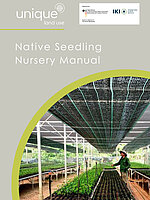Ecosystem-based adaptation in Viet Nam

The International Climate Initiative (IKI) is committed to restoring degraded coastal forests to improve resilience to tropical storms.
With more than 3,200 km of coastline, Viet Nam is highly vulnerable to the impacts of climate change, especially typhoons. Tropical storms like the series of five typhoons that caused landfall in the North Central Coast of Vietnam (NCC) in 2020 have significant negative impacts on human well-being and the economy, especially on the disadvantaged local communities living in rural areas.
Use of innovative native tree planting approach to restore degraded dunes and mangroves
Intact and highly biodiverse coastal forests have essential protective functions and mitigate the effects of tropical storms. The IKI-project Ecosystem-based Adaptation in the North Central Coast of Vietnam: Restoration and Co-management of Degraded Dunes and Mangrove, is the first significant effort to restore degraded coastal protection forests on dunes and sandy areas.
The team successfully developed and piloted an innovative planting approach using exclusively native tree species and simulating the naturally occurring species composition and growth patterns as found in natural forest remnants in the three project provinces (Thua Thien Hue, Quang Tri, and Quang Binh). The primary beneficiaries are the local partner communities.
Successes and Challenges
The project team identified more than twenty site-adapted tree species, raised them in four nurseries, and planted more than 580,000 seedlings on a 450 ha sandy coastal area owned by IKI´s partner communities. Despite extremely poor soils, drought and even fire, initial monitoring efforts in early 2020 revealed excellent survival rates of 80% and above.
The planting on these pilot sites had just been concluded when in October 2020 a series of five consecutive typhoons struck the project sites in NCC. All sites were heavily affected by the long flood and related sand movement. However, thanks to the re-sprouting ability of the selected site-adapted native species, the sites recovered to a certain extent: subsequent monitoring efforts in October 2021 show tree seedling survival rates between 30% and 50%, depending on the level of storm impact and inundation.
Need to upscale nature-based solution for coastal forests restoration
The storm series revealed the need to proactively restore degraded coastal forests against the impacts of climate change. It also demonstrated the suitability and superiority of site-adapted native tree species over exotic species as Acacia and Casurina on comparable sites – particularly due to the re-sprouting ability of native species. Notwithstanding, extra efforts are required to replant the sites to fully achieve the project goals. There is also need to promote the upscaling of this viable nature-based solution for the ecosystem-based adaptation of coastal forests in Viet Nam.
Thanks to a two-year project extension and sufficient additional funding by the International Climate Initiative (IKI), the project will be able to continue until October 2024 and produce the seedlings for replanting in a newly established best-practice nursery for native tree species in Hue.2021
The link has been copied to the clipboard
Contact
IKI Office
Zukunft – Umwelt – Gesellschaft (ZUG) gGmbH
Stresemannstraße 69-71
10963 Berlin
Presentation on IKI Brown Bag Lunch
Related Publications
-
 05/ 2024 | Educational material
05/ 2024 | Educational materialNative Seedling Nursery Manual
English (PDF, 4 MB)
Vietnamese.pdf (PDF, 6 MB)





